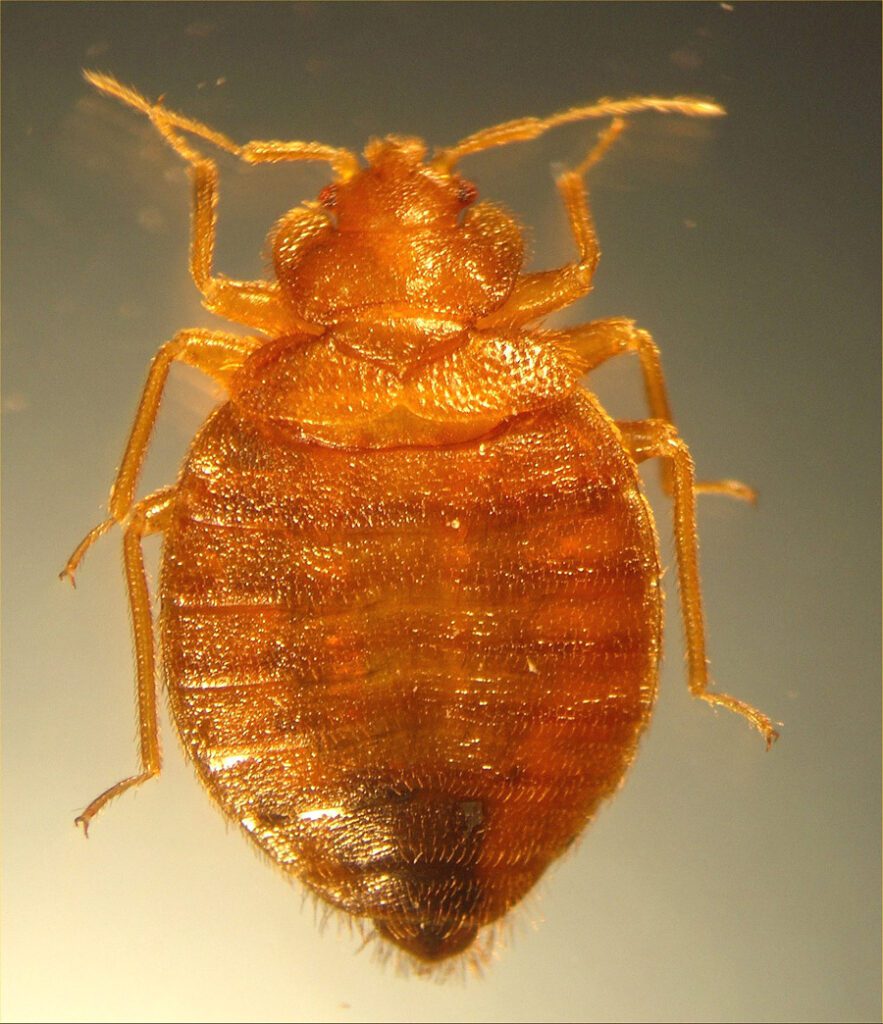Do bed bugs go away in winter? Unfortunately, no! Bed bugs thrive when the weather outside is cooler. The cold winter months provide an ideal environment where they can multiply and spread more easily. If you’ve been dealing with a bed bug infestation this past year and are wondering if there’s any end in sight, keep reading! We will take a look and learn more about how your pest problem will be affected by the change of seasons!
How Do You Get Them?
Bed bugs are tiny wingless insects that live and feed on blood. Adults are reddish brown, flattened, oval-shaped, and about 1/4 inch long. They have long slender beak-like mouths for feeding on blood from humans or other animals. Bed bugs do not transmit diseases to people. Their lifespan is up to one year, and it can take up to three months for someone who has a bed bug bite to show symptoms. This is because the reaction time varies among people. Bed bugs come out at night and prefer warm dark places like beds or couches as they tend not to move far from their living spaces.
Do They Go Away in Winter?
Bed bugs are a problem during the warmer months of the year, but what about the cold weather? Do bed bugs disappear when it gets chilly outside, or do they stay with us all year round? The answer is no, and they don’t just disappear. Bed bugs have been known to stay alive at room temperature for up to 18 months. In general, they will still be active when the temperature drops below 60 degrees Fahrenheit and can survive cold temperatures.
Bed bugs can survive in temps as low as 27 degrees Fahrenheit (depending on how long they’re exposed). If you live in an area with plenty of snow cover, your home could still be infested with these pests, even if it gets a little chilly outside.

How Can You Eliminate Them
Bed bugs are a pest that can be hard to get rid of. Luckily, there are some ways you can try and get rid of them. When looking for bed bug infestations, check any crevices or cracks around your mattress, as well as the seams on your box spring and headboard.
Bed bug bites usually look like small red spots or welts with an initial bite point and no other symptoms. The best way to avoid a bed bug infestation is through prevention. If possible, avoid buying second-hand furniture or anything that may have been exposed to an infestation, such as used mattresses and box springs. Additionally, always check hotel rooms for signs of bed bugs before unpacking your luggage and putting it on the bed or floor.
Are Bed Bugs Worse in the Summer or Winter?
So, are they more prevalent in the summer or winter? Studies and expert observations suggest that bed bugs tend to be more active during the summer months. Warm temperatures accelerate their life cycle, allowing them to reproduce more rapidly. Consequently, they’re more likely to infest new areas and multiply in number during this time. This makes sense when we consider that bed bugs, like many insects, thrive in warmth, facilitating easier movement and feeding.
On the contrary, colder months can slow them down, but it’s crucial to note that indoor heating during winter can still provide a conducive environment for them. The Environmental Protection Agency (EPA) even warns homeowners and renters about the possible uptick in bed bug activities during the warmer periods. While summer seems to be their peak season, always be on the lookout, as these tiny critters can invade homes at any time of the year. Be on the lookout for any new furniture or friends who can potentially bring bed bugs into your home.
Winter Strategies to Get Rid of Bed Bugs
When it comes to battling bed bugs, winter presents a unique opportunity. Many believe that the cold season could be an ally in this fight, and they’re not entirely wrong. Bed bugs, like many other pests, are sensitive to temperature changes. Exposing them to extreme cold can, in fact, kill them.
One effective method is using a ‘freeze treatment,’ where infested items are sealed in plastic bags and placed in a freezer for several days. This prolonged exposure to cold temperatures fatally crystallizes the bug’s internal fluids, ensuring their extermination.
This extreme cold disrupts the cellular functions of the bugs, leading to their demise. However, merely relying on the chilly outdoor temperatures isn’t a guaranteed solution. Bed bugs can hunker down, nestling deep within furniture or fabric folds to escape the cold. It’s important to complement cold treatments with other strategies like thorough vacuuming and the use of diatomaceous earth.
Experts from The University of Minnesota emphasize the importance of a multi-faceted approach, even in winter, to ensure these resilient pests are genuinely eradicated. To stay truly bed bug-free this winter, a combination of cold and consistent prevention methods is key.
Can Bed Bugs Go Away On Their Own?
The short answer is, unfortunately, no. Bed bugs are tenacious creatures, skilled in hiding and surviving in a range of environments. Left unchecked, they can go on feeding and reproducing, leading to a larger, more challenging problem to tackle. The primary reason for their persistence is their ability to go without a blood meal for several months, lying in wait until conditions are favorable again.
If You Already Have Bed Bugs
If you already have an infestation at home, your first step should be identifying where the problem lies. You will want to remove any clutter from around your bed, which can give them more hiding spots. You will also want to inspect your mattress and other furnishings for bed bugs before bringing them into the house again if they were previously infested. Bed bug bites are typically painless, so contact a pest control professional immediately if you notice red welts on any part of your body.



